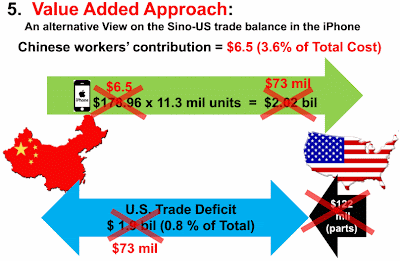Given the truckload of goods China makes for the rest of the world, it may seem odd that the Chinese are concerned with their inability to develop homegrown brands: Why should you develop your own brands when Apple/General Electric/Samsung and whoever else have you have done the heavy lifting of brand-building for you as a contract manufacturer? It's certainly not easy, either--none of the world's top 100 brands are mainland Chinese. The answer is as simple as it is clear: actually making consumer goods constitutes an ever-decreasing share of the profits--if any. The higher value-added activities come from branding, marketing and goodwill which emanate from (surprise!) building up a brand name. In other words, the Chinese get the grunt work and the industrial pollution, while Western companies get the cushy high-salaried jobs and clean air.
Just in time, the FT has an article discussing how the Chinese perpetuate this lamentable situation themselves by preferring imported to local brands. In sociology, it would be classified under "colonial mentality" or believing that former colonizers--be they the Japanese or the Europeans--are superior. After all, they managed to colonize you, right?
Just in time, the FT has an article discussing how the Chinese perpetuate this lamentable situation themselves by preferring imported to local brands. In sociology, it would be classified under "colonial mentality" or believing that former colonizers--be they the Japanese or the Europeans--are superior. After all, they managed to colonize you, right?
Chinese consumers want foreign goods. Whether sports shoes or cars, televisions or mobile phones, cosmetics or nappies [diapers to non-Brits], surveys show that foreign brands predominate. Shaun Rein of China Market Research Group says people trust foreign brands not to cut corners and associate them with more of an established heritage than their domestic labels.Moreover, there is the matter of "sham" trade surpluses (the image above comes from the ADB Institute): trade figures aside, once you adjust for the actual value-added of Chinese exports, the results look rather less impressive:This spells trouble for China as its people become more middle-class and spend more on non-essential items. The more that they buy foreign goods, the more that the proceeds of China’s progress will accumulate to shareholders elsewhere. It will also mean fewer profits for Chinese companies to reinvest in innovation and expertise at home in electronics, for example.
Consider it as a warning sign. Sometime ago, I wrote a journal article together with a marketing scholar about the pressing need for the likes of China to develop brands of its own. Suffice to say that message has gone unheeded, and things may get worse in terms of prospects for Chinese development going forward if this matter is not addressed:Its lack of popular brands is already visible to some degree in its trade balances with other countries. China may run a large nominal surplus but when economists adjust those numbers for the value that it adds or gives away in making goods that are consumed at home or abroad, the numbers tell a very different story.For example, its total trade surplus with the US drops from $189bn to $127bn on a value-added basis, according to calculations by economists at BBVA, the Spanish bank. Most of this reduction is due to value given away in electrical and optical equipment, textiles and clothing.
If China can follow its neighbours and develop its own powerful brands like Samsung of South Korea, or Toyota of Japan, it can sell not only to its own 1.35bn people but to billions of others all over the world.
If it does not build or buy such brands there is a risk that its consistent trade surpluses will become deficits in the decades ahead. That is not what the push to rebalance China’s economy towards consumerism is supposed to do.Consider these folks warned. After all, if you don't buy your own brands, what confidence will others have in them?

